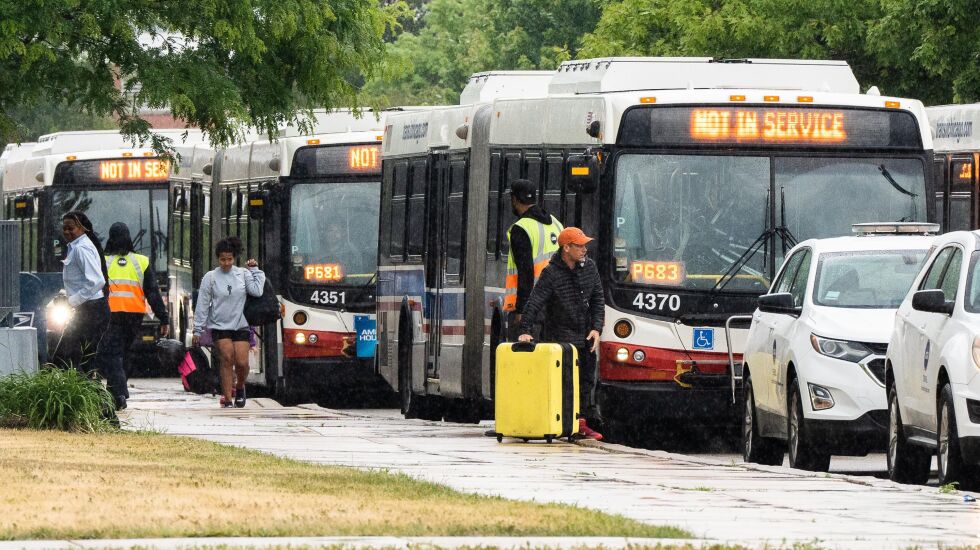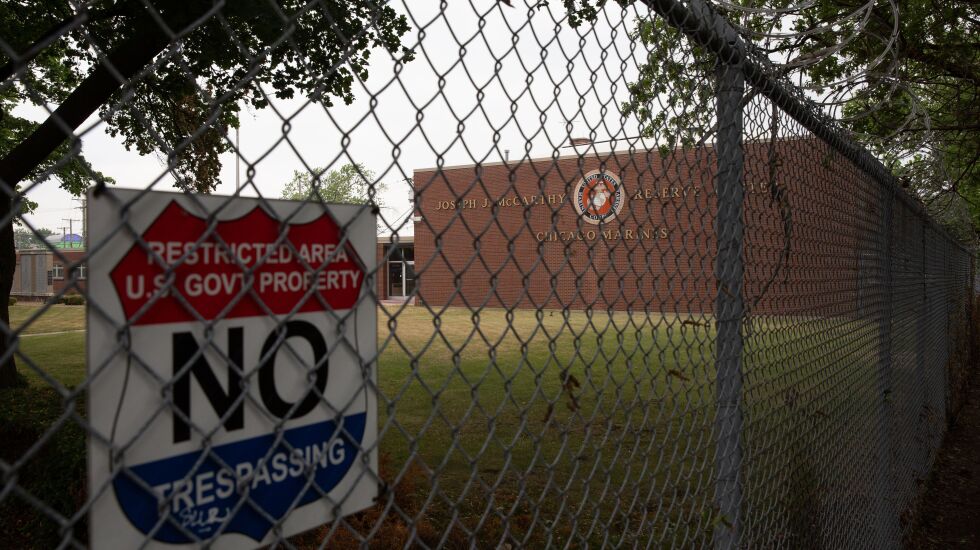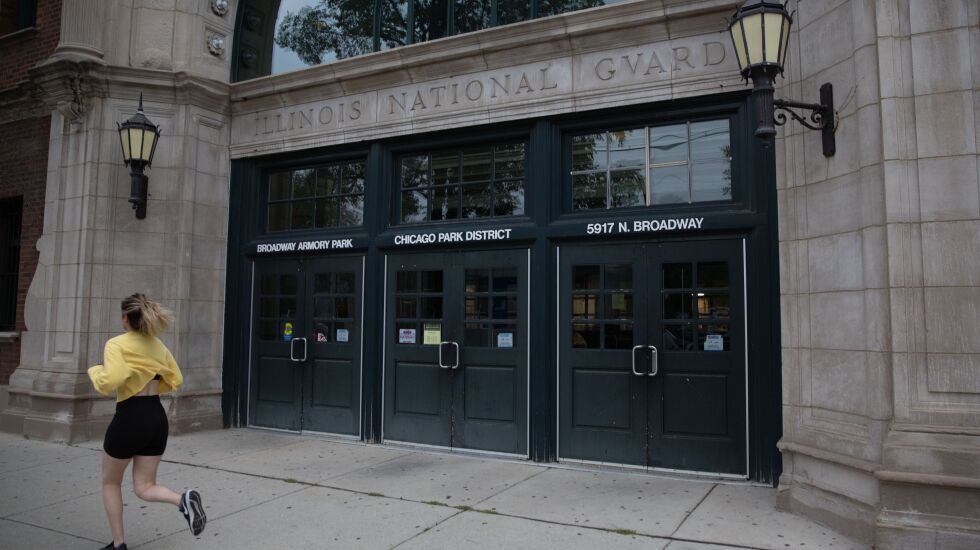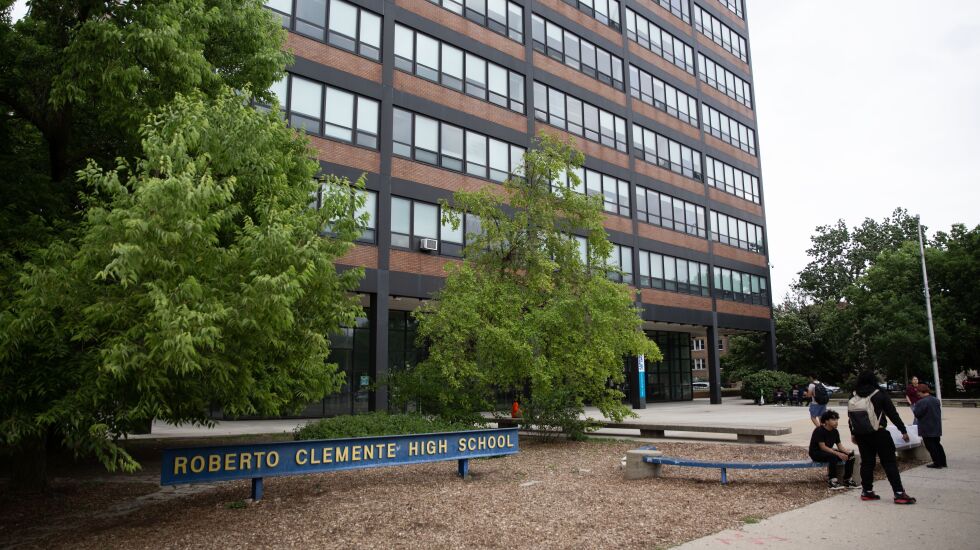
Chicago is taking steps to open up to five new migrants shelters with a combined capacity of nearly 2,500 — including a former Marine Corps Reserve Center and the former Broadway Armory in Edgewater — to grapple with a continued surge of asylum seekers.
Mayor Brandon Johnson’s administration also plans to open a welcoming center at Roberto Clemente Community Academy High School, 1147 N. Western Ave. Ald. Andre Vasquez (40th), chair of the City Council’s Immigrant and Refugee Rights Committee, described it as a point of entry for migrants arriving in Chicago.
The potential new shelter sites were identified in a memo distributed to Council members in advance of Wednesday’s committee meeting on the migrant crisis.
The largest of the new locations would be the former Marine Corps Reserve Center at 3034 W. Foster Ave. in the Far Northwest Side’s 39th Ward. It would have an estimated capacity of 1,000.
In the memo, the facility’s status is described as “awaiting appraisal and environmental assessment.” Local Ald. Samantha Nugent (39th) could not be reached for comment.

Broadway Armory, 5917 N. Broadway, is the second-largest of the newly identified locations. Its status was described: “In discussion w/Alder re: programming impacts and community engagement.”
Newly elected Ald. Leni Manaa-Hoppenworth (48th) said the armory was put to emergency use during the pandemic and called the current situation a “humanitarian crisis.”
But she said she and her constituents have many concerns about using the facility, noting it is “one of the largest in the Chicago Park District” and loaded with community programming.
“It has a senior program,” Manaa-Hoppenworth said. “It has a youth program. It has small businesses running out of there. A theater has a … trapeze school there. People rely on it for their livelihoods. ... Our older adults come there Monday through Friday to probably get the only hot meal that they can get throughout the day. … People utilize the building as a resource — as part of their lives. It’s where students from our public schools go to after school to find a safe place to play sports..
“I’m asking for everybody in the 48th Ward to come together so that we can talk about it. So that we can hear their concerns. Especially those who actually use the facility, that depend on the facility.”

While calling it “unacceptable” for migrants to continue to sleep on the floors of Chicago police stations and even outside those district stations, Manaa-Hoppenworth said no final decision will be made until the community weighs in next month.
“My concern is, there’s a hard deadline for the new arrivals to find a place to sleep other than the police stations. There is an urgency surrounded by that date. I had no part in that decision. But there are a lot of things that are happening that are beyond our control,” she said.“We need to find ways where people can exist together. And that’s always hard — especially since the Broadway Armory is not an empty building. It’s a building that’s well-utilized. Some people have quoted 800 people. Some people have quoted over 2,000 people.”
‘A lot of questions I need answered’
Taylor Park, at 39 W. 47th St., also made the list. It has a capacity of 500. Like the armory, its status notes: “in discussion w/Alder re: programming impact and community engagement.”
But local Ald. Pat Dowell (3rd), Finance Committee chair, said: “There are a lot of steps — a lot of questions I need answered. And I have to have a community meeting.”
The list also includes a former CVS pharmacy in the 22nd Ward.
“It’s an ideal site for a lot of reasons. But, there is absolutely nothing confirmed about that location. … Nothing signed. It might not happen. It’s really up in the air,” said local Ald. Mike Rodriguez (22nd).“I could tell you for certain I wanted to make Piotrowski Park happen, and I worked with the city to do it. That was real easy to do. This is privately held.”
Rodriguez said his constituents have opened their arms to the 200 members of migrant families living at Piotrowski Park.
“We want migrants to come to our community and stay in our community,” he said. “They’re filling our schools. They’re living in our communities. They’ll eventually end up paying taxes.”

Yet another potential location is the Community Justice Center, 9059 S. Cottage Grove Ave. Local Ald. Michelle Harris (8th) could not be reached for comment.
Vasquez said the Johnson administration is identifying potential locations early in the process so the local Council member will know what’s happening.
The chairman said at least some of the new spaces will be necessary.
“As we get closer to the [Democratic National Convention] and closer to the presidential election, I can see more and more buses coming in because, it’s somewhat of a political attack for Republican states to send ’em over. So we’re best to be prepared for a situation like that. Especially as we start heading into the winter months. Then it becomes a whole different scenario,” Vasquez said.
Detailed look at where migrants are from
The briefing paper distributed to Council members includes the most comprehensive look to date at the status of city efforts to care for the roughly 10,500 migrants who have arrived in Chicago since last fall.
Many were placed on buses or planes and shipped to Chicago by Texas Gov. Greg Abbott. Angered by the surge of migrants crossing the Mexican border, Abbott has targeted Chicago, New York, Washington, D.C., and other northern cities run by Democratic mayors as a destination point because they are “welcoming cities” that have vowed to protect migrants.
As of last week, by the city’s count, there were 4,878 “new arrivals” in Chicago shelters, 1,288 of them minors.
Roughly 460 migrants were still sleeping on the floors of Chicago’s police district stations. Another 56 migrants were still sleeping at O’Hare Airport, another situation that the city has tried desperately to eliminate. Equally troubling: New arrivals in those two so-called “staging areas” have increased by 29% in the last week alone.
That demonstrates the losing battle that Chicago is facing.
The overwhelming number of new arrivals (3,442) came here from Venezuela. Columbia was a distant second, with 334 arrivals, followed by a smattering of migrants from Ecuador (67), Nicaragua (50) and Peru (36). Honduras, Mexico, Angola, El Salvador, Russia, Cuba and the Dominican Republic together contributed 126 migrants.
The country of origin for 1,249 other migrants was described as “unknown” because they have “already exited” city facilities, the document states.
The largest of the city’s existing shelters is the Inn of Chicago, at 162 E. Ohio St. on the Near North Side, with 1,398 migrants. That is followed by the former Standard Club in the South Loop (1,084); shuttered Wadsworth Elementary School (588); Daley College (415); Wright College (383); Piotrowski Park (200); Brands Park (144); North Park Village (125); YMCA in Douglas (248) and YMCA in West Ridge (148).
The briefing paper also reminds alderpersons not to use the term “respite” center. The city favors the term “shelter.”
Why? Because “the help that’s needed is a little more long-term,” and not simply “stopping in for help,” Vasquez said.

30-day limit on shelter stays ‘paused’
The memo also states that a policy of giving new arrivals only 30 days at a shelter before having to find their own place to stay has been “paused.”
Some migrants arriving at Daley College this month had expressed concern about the 30-day limit, since many still had not found jobs.
Volunteers have complained about being turned away from making donations at Chicago’s migrant shelters. But the briefing paper states that decision is a matter of liability and setting standards for donated items.
In fact, alderpersons were told the city is “working on a centralized volunteer management system to leverage the good will of volunteers of all stripes.”
The first step is to work with the city’s Department of Human Resources and the Office of Inspector General on a process to “perform background checks and officially recognize them” as city volunteers, the paper states.
“There’s a concern, just in general, about liability when it pertains to government. What happens in the worst-case scenarios? Who ends up responsible — not just in an emergency capacity, but also legally?” Vasquez said.
“The city and the Department of Law, I would imagine, is probably weighing that and saying, ‘We get that everyone wants to help. But we can’t necessarily sign off on some of these things if we’re ultimately responsible for them.”
Contributing: Elvia Malagón







